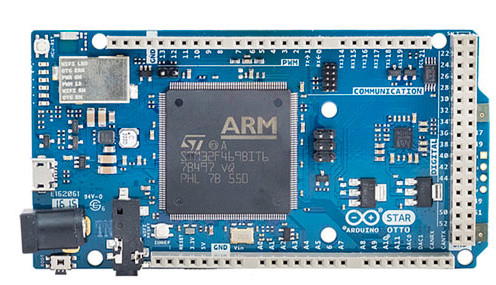STMicroelectronics joins the Arduino community

After Intel and Atmel another major semiconductor manufacturer has officially affiliated itself with the Arduino platform by announcing the STAR (ST and ARduino) program, an agreement to bring the STM32 family of microcontrollers closer to the Arduino maker community. Interestingly, the AR in the STAR “alliance” refers to Arduino.org, not Arduino.cc.
After Intel and Atmel another major semiconductor manufacturer, STMicroelectronics, has officially affiliated itself with the Arduino platform by announcing the STAR (ST and ARduino) program, an agreement to bring the STM32 family of microcontrollers closer to the Arduino maker community. Interestingly, the AR in the STAR “alliance” refers to Arduino.org, not Arduino.cc.
The first product, the STAR Otto baseboard has an Arduino Mega form factor, and is built around the 32-bit STM32F469 MCU. This MCU includes a graphics accelerator and a display interface, which is fully supported by an open-source software graphics library. Moreover, the STAR Otto board provides wireless link and audio capabilities (with on-board MEMS microphone), everything accompanied by the necessary open-source drivers.
The STAR cooperation also plans to create a range of new Arduino shields. A serial display, an NFC-reader and a sensor shield are scheduled for 2016, several STM32 Nucleo expansion boards and software libraries have already been ported to the Arduino platform.
The first product, the STAR Otto baseboard has an Arduino Mega form factor, and is built around the 32-bit STM32F469 MCU. This MCU includes a graphics accelerator and a display interface, which is fully supported by an open-source software graphics library. Moreover, the STAR Otto board provides wireless link and audio capabilities (with on-board MEMS microphone), everything accompanied by the necessary open-source drivers.
The STAR cooperation also plans to create a range of new Arduino shields. A serial display, an NFC-reader and a sensor shield are scheduled for 2016, several STM32 Nucleo expansion boards and software libraries have already been ported to the Arduino platform.
